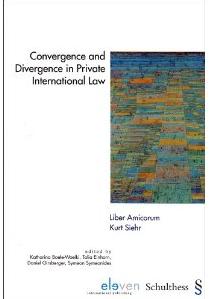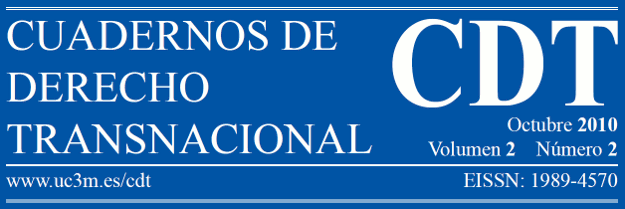P.R. China’s First Statute on Choice of Law
I am grateful to XIAO Fang, Post-doctoral fellow and lecturer at Remnin University Law School, for contributing this report.
The Statute on the Application of Laws over Foreign-Related Civil Relations of the People’s Republic of China was adopted at the 17th Session of the Permanent Committee of the 11th National People’s Congress of the People’s Republic of China on October 28, 2010. It has been promulgated and shall come into force as of April 1, 2011. This is the P.R. China’s first statute on conflict rules.
The Statute comprises 52 articles which are divided into 8 chapters (general rules, civil subjects, succession, real rights, obligations, intellectual property, and supplementary provisions). It will be applied over the civil affairs with elements relating foreign countries and China’s special administrative regions of Hong Kong and Macao as well.
According to the legislators, during the process of drafting, the conflict law statutes of some countries, principally Germany, Switzerland and Japan, and the conventions of the Hague Conference of Private International Law and some Europe Union’s regulations have been referred to.
As most of Chinese civil and commercial statutes already include some conflict rules, for the areas that are not covered by this new statute, such as maritime law, civil aviation law and negotiable instrument law, the conflict rules in the related statutes should still be applied .
In the Chapter of General Rules, the Statute provides for the “application immédiate” of Chinese mandatory rules (Article 4), the defense of public policy against the application of foreign law (Article 5) and excludes renvoi in Chinese courts (Article 9). Pursuant to the new Statute, the limitation of action is governed by the law applicable to the civil relation (Article 7); characterization is governed by the lex fori (Article 8); the applicable foreign law should be ascertained by judges, while the parties should provide for the content of foreign law if they chose to apply it by agreement (Article 10).
During the process of drafting, the principle of most significant relationship has ever been stipulated as the principle of application of laws, like the provision of Article 1 of the 1978 Austrian Statute on Private International Law, which provided for: “The law applicable to foreign-related civil relation should have the most significant relationship with the relation.” Nevertheless, in the final draft of the Statute, the article was deleted, and it was provided for in Article 2(2) that the most significant relationship principle will be supplementally applied in absence of conflict rules in the Statute.
Party autonomy got significant development in the new Statute. Besides contracts and family law, its application was extended to torts and real rights: in the cases of real rights in movables (Articles 37, 38) and tort (Article 44), the parties may choose freely the applicable law.
The new Statute also attaches importance to the protection of weaker parties in international civil relations. In the cases of relations between children and parents (Article 25), maintenance (Article 29), Guardianship (Article 30), consumption contract (Article 42), and product liabilities (Article 45) and so on, the lex personalis i.e. law of the nationality or the habitual residence of the weaker parties or the law which is favorable to the protection of the interests of the weaker party should be applied.
 In the case of the two men who had contracted with a woman living in California in a case of international surrogate motherhood, a Court of Appeal has recently issued its ruling, reversing in part
In the case of the two men who had contracted with a woman living in California in a case of international surrogate motherhood, a Court of Appeal has recently issued its ruling, reversing in part  The Court proceeded first to review the situation of the parent who was the biological father of the twin girls. It found that under Belgian law, since the surrogate mother was not married, the father could have recognized the children and hence legally become their father. The situation was different for the other man who had ‘commissioned’ the children, as he was not biologically linked with the children. The Court found that under Belgian law, there was no possibility to establish a legal parentage between a child and two persons of the same sex, outside the specific situation of adoption by same sex couples.
The Court proceeded first to review the situation of the parent who was the biological father of the twin girls. It found that under Belgian law, since the surrogate mother was not married, the father could have recognized the children and hence legally become their father. The situation was different for the other man who had ‘commissioned’ the children, as he was not biologically linked with the children. The Court found that under Belgian law, there was no possibility to establish a legal parentage between a child and two persons of the same sex, outside the specific situation of adoption by same sex couples.
 The sixth edition of
The sixth edition of  The British Institute of International and Comparative Law will host a
The British Institute of International and Comparative Law will host a 